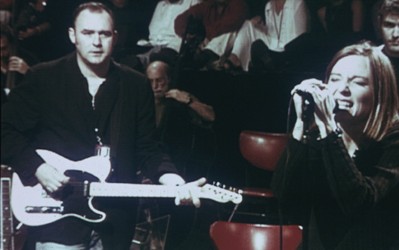portishead
"nobody loves me..its true.."
trip hop - dark. female vocals.
biography from http://ubl.artistdirect.com
YOU'VE heard of film noir, well, now there's a band that plays music noir--that's about the most apt description for the cinematic sound of Portishead. The band prefers not to be lumped into any particular genre, but trip-hop is the banner under which it was initially categorized by the British press, and the label has stuck--much to Portishead's distaste. Displeasure over the classification aside, Portishead's atmospheric, avant-garde pop sensibility does put it within the same lineage of musical evolution as the trip-hop outfits Massive Attack and Tricky.
The term trip-hop surfaced in 1994 as a tag for the unique sound coming out of Bristol, England, the homebase of Portishead. Portishead is the name of the West Coast shipping suburb of Bristol where the band's mastermind, Geoff Barrow, was raised. The town was not a great place to live, according to Barrow, who related to Rolling Stone that, "It looks really pretty and twee, but it's actually quite horrible." Barrow escaped Portishead when he was seventeen by getting a job at a recording studio in Bristol called the Coach House; he worked as a tape operator, but was also the designated "tea boy," the lucky chap who got to serve up tea for the bands that recorded at the studio. While not off scrounging up refreshments for other musicians, he taught himself how to piece together experimental samples, and dreamed of the day that he would form a band that would make music very different from all the "normal" fare he heard day in and day out.
After Barrow had absorbed all he could at the Coach House, he began auditioning vocalists in an effort to realize his dream. He didn't have much luck at first; he had already given about fifty singers a hearing when he ran into Beth Gibbons at the local unemployment office in 1991. Gibbons had been singing in a number of different bands over the years, and most recently had been playing the Bristol pub circuit as the vocalist for a cover band. The two of them found that they shared similar musical ideals, and the former tea boy and the woman who'd been spending her evenings belting out Fleetwood Mac and Janis Joplin tunes now had the beginnings of their own band. The pair commenced writing some music, aided by jazz guitarist Adrian Utley, formerly of the Jazz Messengers and Big John Patton. Word began to spread about their unique sound, and Portishead ultimately succeeded in landing a deal with the UK label Go! Discs, in 1993. Barrow continued to do studio work for other bands, including producing re-mixes for Paul Weller, Depeche Mode, Primal Scream, and Ride.
Joined by engineer-percussionist Dave McDonald, Portishead released its debut album, Dummy, in 1994. The first single from the disc was the moody "Sour Times (Nobody Loves Me)," which got play on radio stations and video channels on both sides of the Atlantic. Barrow and company created the noirish video for the single using scenes from a ten-minute movie called To Kill a Dead Man, which they had completed prior to signing with Go! The black-and-white surrealist film, which features Barrow and Gibbons as sixties-style spies and its video spawn both earned Portishead favorable comparisons to film-score mega-stars like John Barry and Ennio Morricone.
Dummy scored Britain's prestigious Mercury Music Prize in September of 1995, beating out over 140 other British and Irish contenders; other albums in the running included work from PJ Harvey, Blur, Elastica, Tricky, and Oasis. In addition to that coup, Dummy was named 1994's album of the year by Melody Maker, Mixmag, and The Face. At that stage, the band members had spent a fair amount of time granting interviews around the world--enough to determine that promoting the album was their least-favorite part of the whole business. So, Barrow and Gibbons worked out a little deal to make things easier on themselves: he consented to do most of the interviews, because he loves to talk and hates to be photographed; she would do most of the photo shoots, because she feels that the songs already say everything for her. The media-wary band members also spent only a short time on tour, because they wanted to head back into the studio--the Coach House, incidentally--to commence work on their second album as soon as possible. Barrow has remarked that they hope to release "ten albums in ten years--at least." But the band is already a bit off pace of the ambitious goal: its second album, Portishead, came out in September 1997, nearly three years after Dummy.
